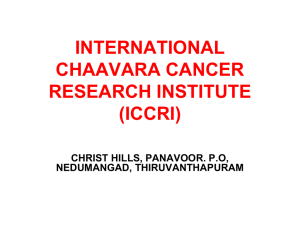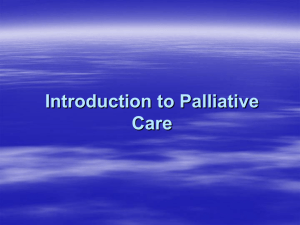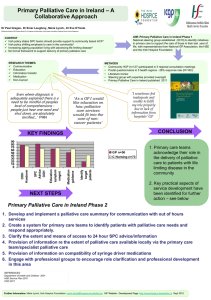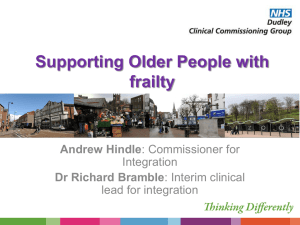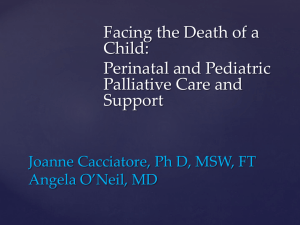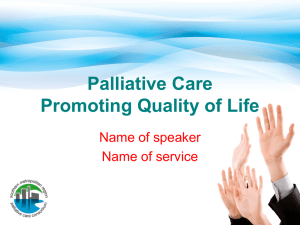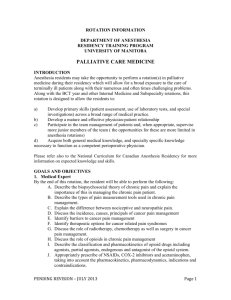Postgraduate Diploma in Health Sciences and Master of Health
advertisement
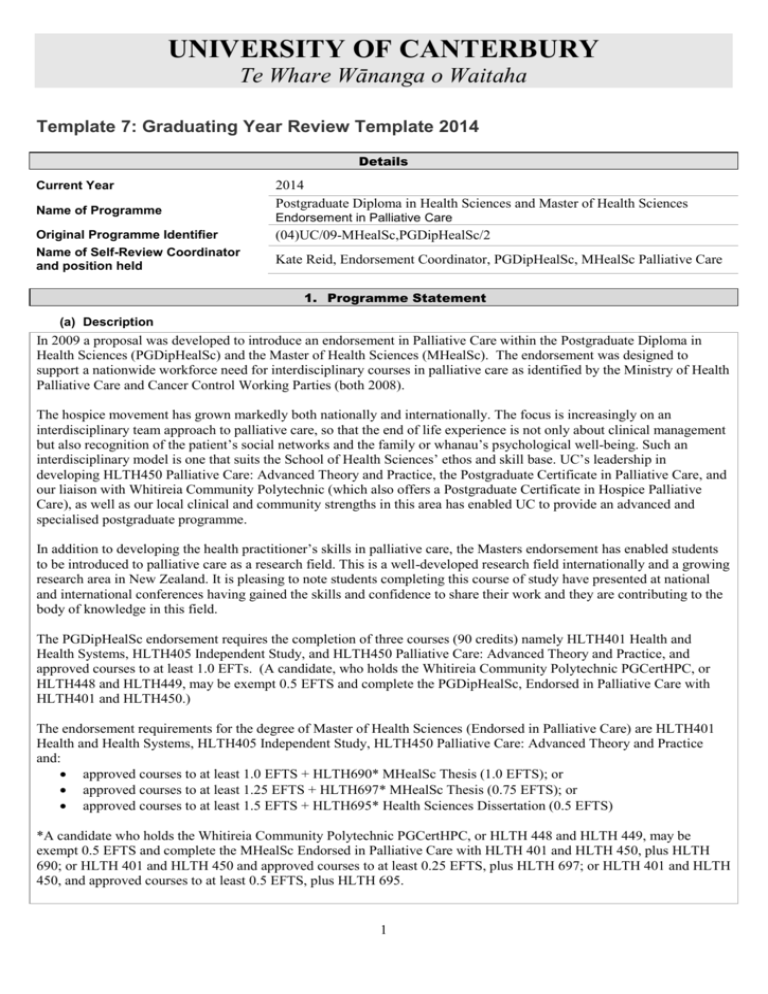
UNIVERSITY OF CANTERBURY Te Whare Wānanga o Waitaha Template 7: Graduating Year Review Template 2014 Details Current Year Name of Programme Original Programme Identifier Name of Self-Review Coordinator and position held 2014 Postgraduate Diploma in Health Sciences and Master of Health Sciences Endorsement in Palliative Care (04)UC/09-MHealSc,PGDipHealSc/2 Kate Reid, Endorsement Coordinator, PGDipHealSc, MHealSc Palliative Care 1. Programme Statement (a) Description In 2009 a proposal was developed to introduce an endorsement in Palliative Care within the Postgraduate Diploma in Health Sciences (PGDipHealSc) and the Master of Health Sciences (MHealSc). The endorsement was designed to support a nationwide workforce need for interdisciplinary courses in palliative care as identified by the Ministry of Health Palliative Care and Cancer Control Working Parties (both 2008). The hospice movement has grown markedly both nationally and internationally. The focus is increasingly on an interdisciplinary team approach to palliative care, so that the end of life experience is not only about clinical management but also recognition of the patient’s social networks and the family or whanau’s psychological well-being. Such an interdisciplinary model is one that suits the School of Health Sciences’ ethos and skill base. UC’s leadership in developing HLTH450 Palliative Care: Advanced Theory and Practice, the Postgraduate Certificate in Palliative Care, and our liaison with Whitireia Community Polytechnic (which also offers a Postgraduate Certificate in Hospice Palliative Care), as well as our local clinical and community strengths in this area has enabled UC to provide an advanced and specialised postgraduate programme. In addition to developing the health practitioner’s skills in palliative care, the Masters endorsement has enabled students to be introduced to palliative care as a research field. This is a well-developed research field internationally and a growing research area in New Zealand. It is pleasing to note students completing this course of study have presented at national and international conferences having gained the skills and confidence to share their work and they are contributing to the body of knowledge in this field. The PGDipHealSc endorsement requires the completion of three courses (90 credits) namely HLTH401 Health and Health Systems, HLTH405 Independent Study, and HLTH450 Palliative Care: Advanced Theory and Practice, and approved courses to at least 1.0 EFTs. (A candidate, who holds the Whitireia Community Polytechnic PGCertHPC, or HLTH448 and HLTH449, may be exempt 0.5 EFTS and complete the PGDipHealSc, Endorsed in Palliative Care with HLTH401 and HLTH450.) The endorsement requirements for the degree of Master of Health Sciences (Endorsed in Palliative Care) are HLTH401 Health and Health Systems, HLTH405 Independent Study, HLTH450 Palliative Care: Advanced Theory and Practice and: approved courses to at least 1.0 EFTS + HLTH690* MHealSc Thesis (1.0 EFTS); or approved courses to at least 1.25 EFTS + HLTH697* MHealSc Thesis (0.75 EFTS); or approved courses to at least 1.5 EFTS + HLTH695* Health Sciences Dissertation (0.5 EFTS) *A candidate who holds the Whitireia Community Polytechnic PGCertHPC, or HLTH 448 and HLTH 449, may be exempt 0.5 EFTS and complete the MHealSc Endorsed in Palliative Care with HLTH 401 and HLTH 450, plus HLTH 690; or HLTH 401 and HLTH 450 and approved courses to at least 0.25 EFTS, plus HLTH 697; or HLTH 401 and HLTH 450, and approved courses to at least 0.5 EFTS, plus HLTH 695. 1 (b) Achievement Summary of Specialist endorsement content: HLTH450 Palliative Care: Advanced Theory and Practice explores historical, political and philosophical concepts and issues in relation to palliative care across the lifespan. Each student builds on their foundational knowledge of this specialty area by engaging in advanced theory, appraising research and available evidence; exploring, reflecting and extending practice competencies within their respective discipline; and as a member of the inter professional team to enable them to inform practice and policy. International, national and local community influences are explored, and leadership skills are developed. Course content from HLTH450 forms a framework for progressing palliative care in the current context and future vision for health care provision in New Zealand and is extended through HLTH405 Independent Study. Graduates of the palliative care endorsements will be able to: 1. Demonstrate understanding of the historical context in relation to the philosophy of care of the dying. 2. Critically examine major influences on developing palliative care practices in New Zealand, drawing on national and international bodies of knowledge. 3. Critically discuss the impact of government strategies on the development of palliative care within your profession and community context. 4. Demonstrate a critical awareness of the philosophical and political influences on the development of palliative care practice in relation to the specialty of hospice palliative care practice. 5. Demonstrate leadership and professional development in palliative care through the scholarly presentation of a piece of work developed as an initiative for change management. 6. Demonstrate specialty knowledge of palliative care from within the healthcare context in which you practice, identifying the role of interprofessional teams in hospice palliative care. In reality all students entering the PGDipHealSc Palliative Care endorsement have come via a postgraduate certificate pathway (either through UC or Whitireia Community Polytechnic). These pathways have provided a positive introduction to postgraduate study for predominantly mature learners returning to tertiary study. The PGCert Palliative Care route has been an important factor in developing skills and confidence for students to continue with postgraduate study. Outcomes: Advanced knowledge, leadership and understanding of palliative care is demonstrated through the successful completion of: 1. Reflective essay of the philosophy of palliative care 2. Critical analysis national/international policy review 3. Service improvement report 4. Oral presentation (c) Changes From 2014 the main endorsement course, HLTH450 is delivered as a single semester rather than a full year course. The only other changes have been content related with new industry changes to patient pathways in end of life care. 2. Review Processes E Account of Review Processes. This graduating year review is the first formal review of the PGDipHealSc and MHealSc endorsement in Palliative Care, and has taken place in conjunction with the full programme review of the PGDipHealSc and MHealSc programmes. The endorsement review comprised Dr Jenny Clarke (Programme Coordinator, Bachelor of Sport Coaching, College of Education) as GYR Convenor alongside Associate Professor Paul Ballantine (Head of Department, Management, Marketing and Entrepreneurship), Chair of the Programme Review Panel; Prof. Allan Smith, University of California, Berkley; Prof. Jeroen Douwes (Massey); Prof. Simon Kingham (UC); Assoc. Prof. Denise Wilson, (AUT); and Prof. Jo Walton (Victoria). The endorsement leader, Kate Reid, also attended a panel session for the full review. Students enrolled in the endorsement course HLTH450 in 2012 and 2013 were surveyed and the anonymous responses reviewed. Only 2 students completed the survey (0 from the 2012 cohort, and 2 from 2013). These two students scored the course 5.0, the top rating possible, for all areas. Three current students attended a meeting with the full review panel, 2 and a further three graduates were interviewed by phone by the GYR Convenor with a summary of feedback being presented to the full review panel. Three employers of graduates from the endorsement programmes were also interviewed by phone. Those that were interviewed were given the opportunity to comment on the relevance of the programmes to their work, or the work of their employees and to offer suggestions for improvement. The endorsement leader, Kate Reid, provided a self-review document of the PGDipHealSc and MHealSc endorsed in Palliative Care. 3. Review Outcomes E (a) Acceptability Staff, graduates and stakeholders view the programme as meeting the programme objectives and all were strongly positive of the programme. In addition, stakeholders noted that this programme is a requirement for hospice workers under the 2014 Resource and Capability Framework. (b) Assessment procedures and student performance The PGDipHealSc and MHealSc endorsed in Palliative Care involve two core courses which specifically address the endorsement: HLTH405, in which students undertake an independent study in their endorsement area, and HLTH450 which consists of an oral presentation, a policy review, a reflective essay and a service improvement report. All of these assessments are relevant and authentic, linking theory to practice. All of the graduates commented positively on the quality and relevance of the assessments. A range of student work was reviewed by the panel and was found to be of an appropriate standard for Level 8 of the NZQA framework. Moderation process. The leaders of the PGDipHealSc and MHealSc endorsements have close relationships with industry providers and palliative care professional bodies, many of whom are contributors to these programmes. These stakeholders are also consulted about content of assessments to ensure they are relevant to the industry. The courses are also is externally moderated yearly by Whitireia Polytechnic which also delivers this qualification. (c) Data Table 1: Numbers enrolling and completing the Master of Health Sciences endorsed in Palliative Care Year Projected No. Enrolling Actual No. Enrolled Full-time Parttime EFTS 2011 * 1 0 1 0.3 0 2012 * 4 0 4 1.7 0 2013 * 2 0 2 0.5 No. Completed 1 Withdrawals 0 Table 2: Numbers enrolling and completing the Postgraduate Diploma in Health Sciences endorsed in Palliative Care Year Projected No. Enrolling Actual No. Enrolled Full-time Parttime EFTS No. Completed Withdrawals 2011 * 2 0 2 0.4 3 0 2012 * 8 0 8 3.2 2 0 * 6 0 6 2.2 8 0 2013 * it was anticipated that 5-6 students annually would work toward the Palliative Care endorsement, many part time (d) Programme Evaluation The adf GYR panel and the staff of the PGDipHealSc and MHealSc endorsed in Palliative Care believe that the endorsement programme has achieved its aims and is working well, with the programme meeting CUAP, School of Health Sciences and industry expectations. This endorsement was developed to meet the specialist knowledge required for those working in palliative care. The palliative care work force consists of a range of professionals (such as nurses, counsellors, occupational therapists, doctors, etc). Many of the students completing the programmes are mature women who have been away from academic study for a considerable number of years and this brings unique challenges for staff. All students interviewed were women who have been working palliative care positions for some years, or who are long-term health workers for whom palliative care is a significant component of their day-to-day work. 3 The feedback from graduates was consistently and very strongly positive. While they found the technical demands of using computers initially daunting, all commented specifically on the support they received from Kate Reid, commenting that she was accessible through text, phone, email and was very responsive and the key reason for their success. When questioned about the aims of the graduate profile of their programme, those interviewed were able to articulate clearly their learning in relation to these aims. As a group, the graduates commented on their ability to critically analyse, question and investigate practice effectively in their workplace; they acknowledged that this was a direct result of completing the PGDipHealSc or MHealSc endorsed in Palliative Care. All graduates commented that they found the assignments helpful and relevant, and that they were able to apply knowledge they developed in their workplaces. Two graduates commented positively on the help and further teaching they could provide to colleagues as a direct result of their studies. The graduates commented that they felt the lectures were very nursing focussed; however all were extremely positive about the programme and their learning in the courses. They explained that it had enhanced their knowledge and they had applied knowledge to their practices in palliative care. Stakeholders interviewed were also very positive and supportive of the qualification. They commented on the need for the qualification within the Resource and Capability Framework, commented positively on the approachability of the endorsement leader, and stated significant satisfaction on the content of the specific endorsement courses and the overall programme. The qualification has become an integral part of their quality service provision. The stakeholders interviewed could not identify any gaps in the qualification. In summary, all interviewed were very positive about the PGDipHealSc and MHealSc endorsed in Palliative Care, and believe it contributes significantly to palliative care in New Zealand. It has met its initial goals of increasing the knowledge and expertise of palliative care industry workers to contribute to the quality of care provided, as described to CUAP in its initial application to develop the qualification. Stakeholders also reminded the panel of the need to increase the number of well-trained workers in Palliative Care with the massive grown in the population of old and very old people in New Zealand, presenting with multiple serious health conditions. (e) Continuation or Discontinuation We recommend that the Postgraduate Diploma in Health Sciences and Master of Health Sciences, both endorsed in Palliative Care, be continued. The Academic Administration Committee considered the Graduating Year Review. It agreed with the recommendations of the review panel and noted the improving enrolments. 4


